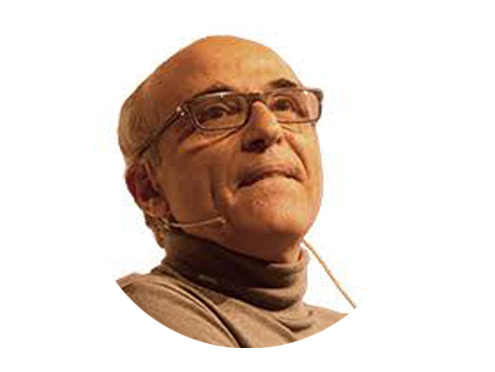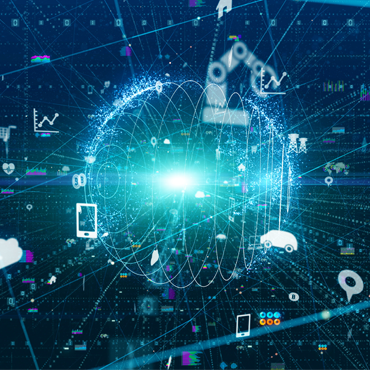Digital revolution: Missing in action or maybe just a hashtag


By unifying every subsystem, digital technology has itself become a single structured organism living within society, transforming, manipulating and exploiting it, claiming to solve all mankind’s problems in order to lead the way to happiness through omnipresent networks, video surveillance, biotechnology, nanotechnology and the now pervasive artificial intelligence.
What we are witnessing is a form of colonisation of the human imagination by technology, which is effectively creating digital addiction. This, truth be told, is what is meant by the term “digital revolution”. Revolution? Today, despite the proclamations, despite the expansion and standardisation of technology, it would be more accurate to use the term digital "revolts”. The “digital revolution” currently lives mainly in the pages of newspapers, in the presentations of software companies that always claim that businesses that have adopted this “revolutionary” spirit have gone from teetering on the brink of bankruptcy to being revenue-generating powerhouses; applications that are constantly sold and advertised as destined to change forever how we live in this world.
Is it not perhaps very stressful for sellers (oops, accounts) when their sales targets increase each year? More and more each year, each year more and more promises. Productivity has to be increased as much as possible.
COVID has had the same effect as hiding in a shelter during a bomb raid in a war. Once the sirens stopped sounding, people went back outside to see the ruins left by the bombs. What ruins has COVID left for us? What do we want to build on these ruins? What is the meaning of a revolution if everything is handled on the spur of the moment? We have confused, and continue to confuse, resilience with the concept of fault tolerance. Antonio Gramsci wrote: "The old world is dying, and the new world struggles to be born. Now is the time of monsters". True revolution is achieved with resilience; a revolt is merely fault tolerance. True resilience is creativity, not stubbornness and imitation, and has to do with people; fault tolerance is just an annoying breakdown that needs to be repaired and has to do with machines. The machines are formatting us. This is what we are destined to witness in the coming years, and the first step will be when the hashtag “The customer comes first” finally gives way to “The supplier comes first”. Or, to be more accurate, when the inseparable customer-supplier binomial is no longer the rule. What resources will be used to stage this pseudo-revolution? Once again, it bears recalling that the Italian word for “resources” (“risorse”) is the third person singular of the remote past tense of the Italian verb “risorgere” (“to rise again”). In Italian, the remote past is used for actions that took place in the distant past and that no longer have any bearing on the present, physically or emotionally. This is precisely what is happening: we think we can colonise the future with resources linked to the past.

Self-realisation has become an end unto itself (a revolt, in other words). It is no coincidence that an advertisement for a well-known drug (Paxil) sold as the “happiness pill” claims: "Do more - Feel better - Live longer".
Do more (regardless of what you are doing)?
Feel better (without it mattering where this feeling comes from)?
Live longer (without considering quality of life in the additional years)?
And the impacts on our surroundings? Everyone is an ecologist, only to forget all about it as soon as we need face masks — we will save the world later, there is still time.
The digital revolt has standardised what we might term the “blink culture”. Everything must be consumed quickly. There are countless sites where speeches are limited to 20 minutes, others that offer summaries of books that condense 200-page tomes into a few lines (truth be told, they guarantee a maximum of ten pages). Essentially, blink culture has to do with bullet point culture. Just titles. We rack up bullet points and likes, pretending they are knowledge, culture and success: blinks.
The consequence: fast food, blitz meetings, short naps and therapy sessions, speed reading, making money before age 20, etc. As Eugenio Borgna writes: "Short, new and exciting have replaced lengthy, repeated and reflective."
Is it not perhaps very stressful for sellers (oops, accounts) when their sales targets increase each year? More and more each year, each year more and more promises. Productivity has to be increased as much as possible.
COVID has had the same effect as hiding in a shelter during a bomb raid in a war. Once the sirens stopped sounding, people went back outside to see the ruins left by the bombs. What ruins has COVID left for us? What do we want to build on these ruins? What is the meaning of a revolution if everything is handled on the spur of the moment? We have confused, and continue to confuse, resilience with the concept of fault tolerance. Antonio Gramsci wrote: "The old world is dying, and the new world struggles to be born. Now is the time of monsters". True revolution is achieved with resilience; a revolt is merely fault tolerance. True resilience is creativity, not stubbornness and imitation, and has to do with people; fault tolerance is just an annoying breakdown that needs to be repaired and has to do with machines. The machines are formatting us. This is what we are destined to witness in the coming years, and the first step will be when the hashtag “The customer comes first” finally gives way to “The supplier comes first”. Or, to be more accurate, when the inseparable customer-supplier binomial is no longer the rule. What resources will be used to stage this pseudo-revolution? Once again, it bears recalling that the Italian word for “resources” (“risorse”) is the third person singular of the remote past tense of the Italian verb “risorgere” (“to rise again”). In Italian, the remote past is used for actions that took place in the distant past and that no longer have any bearing on the present, physically or emotionally. This is precisely what is happening: we think we can colonise the future with resources linked to the past.

We are adapting our behaviour to the machines, and not vice versa. After all, the revolution will lead us to wellbeing and success, but how is it measured? In the end, what do you have to complain about? It is simple: try entering the term “rich people” into any search engine and look at the images (almost all white-skinned), then try “poor people” and again look at the images (almost all dark-skinned). Is this the revolution? No, this is the revolt of the satisfied. “Therefore consider carefully how you listen. Whoever has will be given more; whoever does not have, even what they think they have will be taken from them”. Luke 8:18. In the end, one need simply ask: who wins on the motorway? As fast as you may go, there will always be someone ahead of you and you can never pass everyone. You can win for a bit, but then you have to understand when to slow down. Simple!





